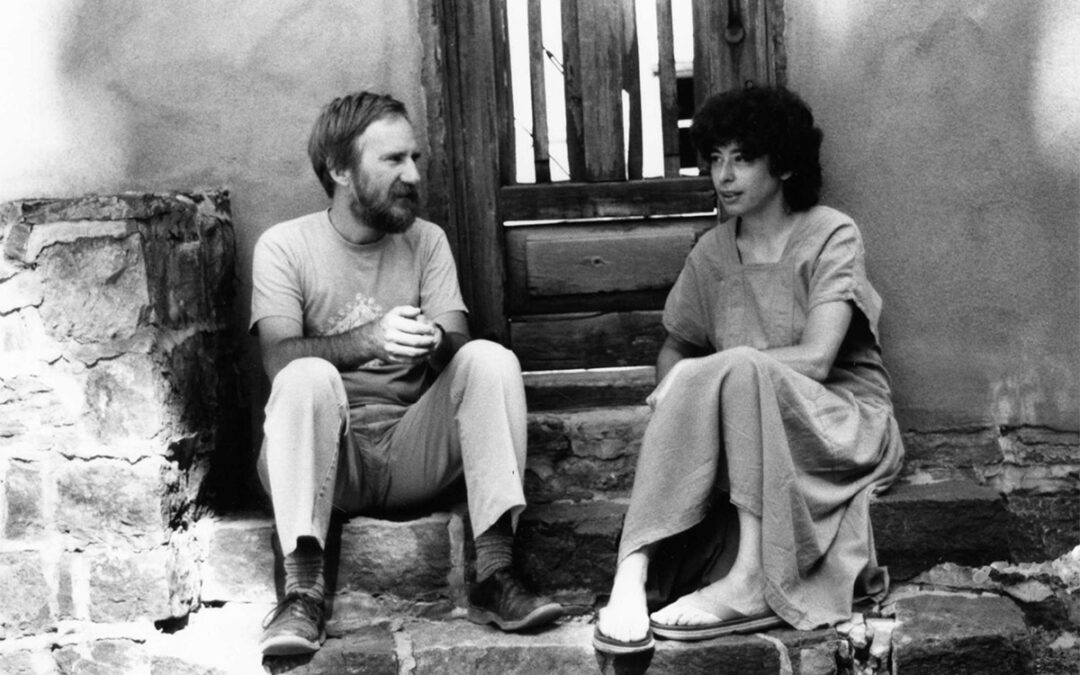1986-87 Weatherhead Fellows, Timothy A. Kohler and Carla M. Sinopoli. Photo courtesy of the School for Advanced Research.
In celebration of fifty years of resident scholars at SAR, we are publishing a series of posts about the program and scholars over the years.
Perhaps you know you’ve arrived in the field of archaeology when the United Nations invites you to be a lead author on their Intergovernmental Panel on Climate Change assessment report as the first archaeologist in that role. Or maybe it’s when you’re elected to the National Academy of Sciences in 2022.
Tim A. Kohler didn’t start as a Southwestern archaeologist.
Kohler received his PhD from the University of Florida in 1978 in anthropology, studying Weeden Island societies in North Florida. Along the way, he became increasingly intrigued by the archaeology of the Southwest.
Kohler remembers that archaeologist Linda Cordell, long associated with SAR, had an impact on him.
“When I was just getting into Southwestern archaeology in 1979, she published a very important article,” Kohler said. The article was “Escaping the Confines of Normative Thought,” co-authored with Fred Plog. It expanded Kohler’s thinking. Kohler said that it “pointed me in the direction of thinking about complex systems.” Kohler learned that it was important to “not just look for the central tendency for a pattern, but all of the variability around it.”
For six intense years, he worked in Southwest Colorado on the Dolores Archaeological Program with William D. Lipe (both at Washington State University). It all happened so fast that he needed time to reflect on the work they had done. The fellowship at the School of American Research (SAR) provided that opportunity.
Kohler was a Weatherhead Fellow at SAR from 1986-1987. His project was “Synthesis of Recent Research on the Anasazi of Southwest Colorado.”
The SAR Scholar Program “had and has a terrific reputation,” said Kohler. “It’s everyone’s dream to spend a year there on sabbatical. For me, it was particularly attractive because I was becoming a Southwestern archaeologist.”
The SAR residency provided the opportunity for Kohler to get involved with planning for archaeological investigations of Bandelier National Monument, which happened in the four years after his time at SAR. “It was a nice stepping stone for me.”
Kohler also coordinated with the multi-disciplinary and multi-institutional Village Ecodynamics Project (VEP) to better understand the causes for changes in settlement systems in the eastern Southwest from A.D. 600-1760. In 2014, the VEP was selected by the Shanghai Archaeology Forum as one of the top ten projects in the world for major archaeological research findings.
In archaeology, Kohler is best known for developing agent-based modeling: using computer simulations to study the interactions between people, things, places, and time. He also helped develop systems to make paleoclimatic data widely accessible. He is a principal investigator on the Synthesizing Knowledge of Past Environments (SKOPE) Project, an online resource for paleoenvironmental data and models.
Looking to the future, Kohler sees archaeology heading in a direction that gives more consideration to global processes. “In the 1960s, we all became very scientific and tried to form hypotheses to prove or disprove,” Kohler said. “In the ’80s and ’90s, there was a real reaction against that: there are events in history, and it’s important not to just think about processes all the time. It had a splintering effect on the discipline. We’re just beginning to emerge from those local and specific interests to try to think about global patterns again.”
“In global archaeology,” said Kohler, “you have to tend to both history and process. Your scope is bigger. You aren’t just going to study one river drainage. You look for how what is happening in one area is affecting another.”
Watch Tim Kohler’s presentation, “10,000 Years of Inequality: The Archaeology of Wealth Differences,” at the New Mexico History Museum in 2024.
NEXT WEEK: Three siblings from Santa Clara Pueblo who were resident scholars together in 1996
SOURCES:
Crow Canyon Archaeological Center. Board of Trustees. Research Associate. https://crowcanyon.org/people/kohler-tim/
Ferguson, Will. “WSU archaeologist plays major role in UN climate report.” WSU Insider. March 9, 2022.
Interview with Tim A. Kohler on April 27, 2024.
National Academy of Sciences, Member Directory. https://www.nasonline.org/member-directory/members/20054345.html
Santa Fe Institute. External Professor. https://www.santafe.edu/people/profile/tim-kohler
Washington State University. Anthropology Department. Faculty and Staff. https://anthro.wsu.edu/faculty-and-staff/tim-a-kohler/
